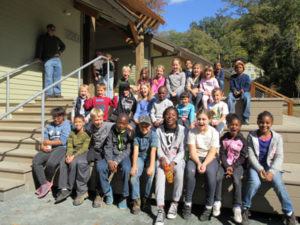Buildings as Teaching Tools
Since its founding more than six decades ago, the Alice Ferguson Foundation has been  dedicated to educating visitors of all ages about the natural world, inspiring them to recognize their role in protecting it and seeking innovative ways to solve environmental challenges. When it came time to renovate and refresh our educational campus, we challenged ourselves to incorporate the latest advances in environmental design and construction. Our goal is for students to have an inspiring place to learn and to construct buildings that serve as powerful and innovative teaching tools.
dedicated to educating visitors of all ages about the natural world, inspiring them to recognize their role in protecting it and seeking innovative ways to solve environmental challenges. When it came time to renovate and refresh our educational campus, we challenged ourselves to incorporate the latest advances in environmental design and construction. Our goal is for students to have an inspiring place to learn and to construct buildings that serve as powerful and innovative teaching tools.
The unveiling of our Living Building, marks a major milestone in our multi-phase project that provides educational facilities constructed with the greenest building standards in the world today. The thousands of students who visit our Hard Bargain Farm Environmental Center will learn how design and construction can make the world a better place. In keeping with the Foundation’s mission, the building will work in harmony with nature, allowing us to utilize the building as both a classroom and a teaching tool.
All building users will have an energy and water ‘budget’ to manage during their stay. Electronic tablets that are connected to the buildings’ infrastructure will allow constant monitoring of resource use, even when students are not in the building. The data will inform any adaptations and new strategies that may need to be made as each group of students seeks to help the Foundation meet the net zero energy and water goals inherent in the Living Building Challenge. The data will be analyzed, synthesized, and shared as part of our commitment to sustainability, learning, and innovation.
Our core values of Education, Inspiration, and Innovation are serving us well as we transform our aging infrastructure into one of the most innovative and inspirational education facilities anywhere in the world. The Living Building will not only enhance and upgrade our structure but also serve as a tool for teaching Science, Technology, Engineering, and Math (STEM) concepts, as well as augment our core ecological curriculum.

